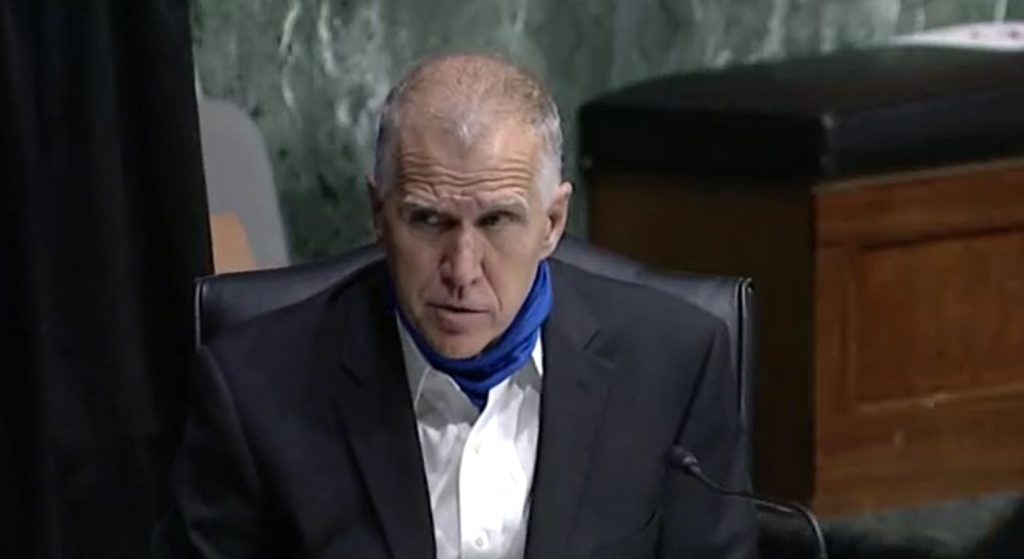“In your haste to issue this Draft Policy, you have barred future leaders of those agencies from contributing to a dramatic policy change that bears their agency’s name and would commit their agency’s employees to a policy direction without their input.” – Senator Thom Tillis
Senator Thom Tillis (R-NC) today sent a second letter to U.S. Attorney General Merrick Garland and Assistant Attorney General – Antitrust Division at the U.S. Department of Justice (DOJ) Jonathan Kanter expressing concern over the process for releasing, and the substance of, a revised version of the Joint DOJ-U.S. Patent and Trademark Office (USPTO)-National Institute of Standards and Technology (NIST) Policy Statement on Remedies for Standards-Essential Patents Subject to Voluntary FRAND Commitments. Tillis sent an initial letter on December 10, 2021, four days after the DOJ published the latest iteration of the Policy Statement for public comment.
While the 2021 Statement did not quite revert back to the 2013 Policy Statement, which drew much criticism from patent owners, the 2021 draft walked back the 2019 Statement’s support for the availability of injunctive relief in SEP cases by placing more emphasis on negotiation. A DOJ press release about the 2021 Statement said: “The draft statement indicates that good-faith negotiation that leads to widespread and efficient licensing between SEP holders and those who seek to implement standardized technologies can help to promote technology innovation, further consumer choice, and enable industry competitiveness.”
Substance and Process
Today’s letter explained that Tillis is “concerned by what appears to be the DOJ’s attempt to diminish patent holders’ statutory rights and undermine the judicial process by substituting the courts’ judgement [sic] for its own.” The letter added that the 2019 version of the statement should not be revised, as it “appropriately clarified” that injunctive relief should be available to standards-essential patent (SEP) holders if the court determines the relevant legal requirements for such relief are met. The 2021 statement, by comparison, places too much emphasis on “good-faith negotiation” and suggests that seeking injunctive relief is generally inconsistent with the goals of the fair, reasonable and non-discriminatory (FRAND) commitment. “Good faith is entirely subjective,” Tillis’ letter said, “and depends on many factors—including the specific terms of any particular F/RAND obligation and the actual conduct of the parties.”
As to the process by which the 2021 statement was drafted, Tillis noted that two of the three agencies involved in the joint statement (the USPTO and NIST) still lack confirmed political leaders, and Kanter had only been confirmed three weeks before the statement was issued. “In your haste to issue this Draft Policy, you have barred future leaders of those agencies from contributing to a dramatic policy change that bears their agency’s name and would commit their agency’s employees to a policy direction without their input.” In a footnote, Tillis questioned whether future leaders would agree, for example, whether the Draft Statement should have been published in the Federal Register or whether the language makes it clear that the statement is non-binding on the public. He concluded the letter by urging the DOJ to hold off on revising the Policy Statement prior to confirmation of USPTO and NIST leaders: “Any continued pursuit of this policy by your office before [sic] will demonstrate a failure of innovation leadership by this Administration.”
Federal Register Comments
Tillis also submitted the letter to the Federal Register as a public comment in response to the DOJ’s request. As of the time of publication, 56 comments had been received there, many in agreement with Tillis, with a few exceptions.
Professor Michael Carrier of Rutgers Law School, for instance, said the 2021 Statement “presents a welcome return to the bipartisan balanced treatment of standard essential patents that—with the exception of the period from 2017 to 2020—has applied for the last two decades.” Carrier said the new statement is balanced in its recognition that both sides can engage in “opportunistic behavior”—something that was missing from the 2019 Statement. It also emphasizes and elaborates on the framework for “good-faith negotiations,” which had been lacking in the 2019 Statement, and appropriately articulates an approach to remedies “that reflects the caselaw,” Carrier wrote. “In the past 15 years of bipartisan recognition of the potential harms of patent holdup, the period from 2017 to 2020 marked a radical detour,” charged the letter, calling the 2019 Statement “one of the most egregious examples of that misguided approach.” The 2021 Statement thus represents a “return to reasonableness,” Carrier said.
Comments on the 2021 Draft Policy Statement are due by February 4, 2021, and can be submitted here.

![[IPWatchdog Logo]](https://ipwatchdog.com/wp-content/themes/IPWatchdog%20-%202023/assets/images/temp/logo-small@2x.png)


![[Advertisement]](https://ipwatchdog.com/wp-content/uploads/2024/04/Patent-Litigation-Masters-2024-sidebar-early-bird-ends-Apr-21-last-chance-700x500-1.jpg)

![[Advertisement]](https://ipwatchdog.com/wp-content/uploads/2021/12/WEBINAR-336-x-280-px.png)
![[Advertisement]](https://ipwatchdog.com/wp-content/uploads/2021/12/2021-Patent-Practice-on-Demand-recorded-Feb-2021-336-x-280.jpg)
![[Advertisement]](https://ipwatchdog.com/wp-content/uploads/2021/12/Ad-4-The-Invent-Patent-System™.png)







Join the Discussion
One comment so far.
Anon
January 20, 2022 10:48 amI wonder if Professor Carrier would care to opine on Efficient Infringement.